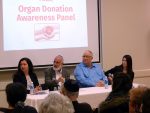Left to right are panelists at a recent National Council of Jewish Women panel on organ transplants: Dr. Aviva Goldberg, Rabbi Yossi Benarroch, Marshall Miller and Na’ama Miller. (photo from NCJW)
On Dec. 11, the Winnipeg section of National Council of Jewish Women (NCJW) held an organ donation awareness event, featuring community members Rabbi Yossi Benarroch, Dr. Aviva Goldberg, and husband (organ recipient) and wife (organ donor) Marshall and Na’ama Miller.
Benarroch spoke first, after a welcome from organizers and a video about organ donation (youtube.com/watch?v=5cfaAWTH5zM).
“The short of it is, basically, that Jewish law permits organ donations,” he said. “There’s no question about that. Of course, when we talk about law, law is complicated and there are lots of opinions. There’s an ideal in Judaism, which is one of those foundations, and it’s called ‘pikuach nefesh doche hakol’ … which basically means that, in Judaism, there’s nothing more important than saving a life.
“I’m a very observant Jew and I keep kosher,” he said, “but if I had to eat something that wasn’t kosher – pork or whatever – in order to save my life, then Jewish law says you’re obligated to do that.”
Benarroch said it is written that, if someone saves a life, it is as if they have saved the entire world. Furthermore, he said, we are called to not stand idly by if another person is suffering. “We are obligated to intervene and actually obligated to help that individual,” he said.
Marshall Miller, who was diagnosed with progressive kidney disease more than 25 years ago, eventually required replacement therapy.
“Slowly, over time, my kidney failure began to get worse and worse,” he shared. “The disease progressed to the point where, a few years back, my GP at the time said, ‘Marshall, you’re now at the point where you have to go see a specialist because I can’t do anything more for you here … you need an expert to deal with your situation.’
“Everybody who suffers from kidney disease understands that, what kidneys do, among many things, is purify your blood. When your blood isn’t being purified properly, you can start to feel kind of lousy. I think my family can attest to the fact that I was starting to feel lousy. I think my whole family suffered along as I did, as I got sicker and sicker.”
When his kidney function was down to less than 10%, the specialist started talking seriously about replacement therapy. This involved dialysis three times a week until a matching donor could be found.
During the search for a donor, Na’ama Miller decided to find out if she might be able to help other people in her husband’s situation. As it turned out, she was a match for her husband.
“We were told it was a one hundred million shot,” she said. “And so, we were next faced with a bit of a dilemma … because it was scary for the kids. But Samantha and Maya were very much in favour of it, because they didn’t want me to be miserable anymore.”
She said, “People ask me, how I could do this … if it was hard. I give everyone the same answer. It was a no-brainer, a very easy decision for me. As Marshall said … we were all suffering along with him.”
“It’s worth it. You saved a life,” her husband added. “We hope this event here – even if only one more person signs up … hopefully, more and more people will choose to do it among the Jewish community after hearing the story.”
After the Millers spoke, a second video was screened, about a former Winnipegger who donated a kidney to save the life of a woman in California, who he has never met.
“Right now, in Canada, there are over 4,500 people waiting for an organ transplant – 4,500 Marshalls,” said Goldberg, who is the director of the Canadian Society of Transplantation and chair of the Transplant Manitoba kidney allocation review committee. “We don’t have 4,500 Na’amas. That’s why we need donors – both living and also deceased donors.
“That’s what we want to talk about today,” she said, “even if you don’t go forward to become a living donor, which is a really big deal. It’s not something that every person in this room is going to be able to do and that’s totally fair. But, there’s something that everyone in this room can do and that’s to sign up for organ donation after you’ve died – say that this is something I’d like to do, that you’d like to leave a legacy … you can save lives after you’ve died, either with organ or tissue donation. You can save lives by donating organs – heart, liver, lungs, pancreas, kidneys and even small bowel – but, also tissue donation.”
In some cases, people can donate their corneas to help improve the life of others. According to Goldberg, Manitoba, last year, was the fourth on the world list of most donors.
While Goldberg implored people to sign up as donors online, she further reminded them that talking to family about your willingness to be a donor is also very important – and not just immediate family, as they might be in the same car with you when you have a horrific accident, for example.
“The way that organ donation works in Canada, here, in Manitoba, is that after someone has died and they are potentially going to be an organ donor, their family is approached,” said Goldberg. “If you sign up for the registry, it’s a way of saying to your family, on the very worst day of their lives, that this is something your loved one wanted – wanted so much that they went to the registry, signed up, made that choice. It’s a hard discussion to have … [but] it’s so important to do.”
During the question-and-answer period, one attendee asked if there was an age limit for someone to donate an organ. The answer? “No.”
Another question was about the possibility of rejection and, to that, Marshall Miller shared his experience. “I suffered from a mild early rejection,” he said. “But, the ability to detect the rejection and be able to remedy it is incredible. They were able to treat me with medication instantaneously and, really, it was a non-issue for me. Even though there is a risk of rejection, it can easily be found if you attend your appointments and take your medication.”
For information on organ donation in British Columbia and to register, visit transplant.bc.ca.
Rebeca Kuropatwa is a Winnipeg freelance writer.


